Unit 3 Safety Lesson 16 How Safe Is Your Home? 课件(27张PPT)
文档属性
| 名称 | Unit 3 Safety Lesson 16 How Safe Is Your Home? 课件(27张PPT) |
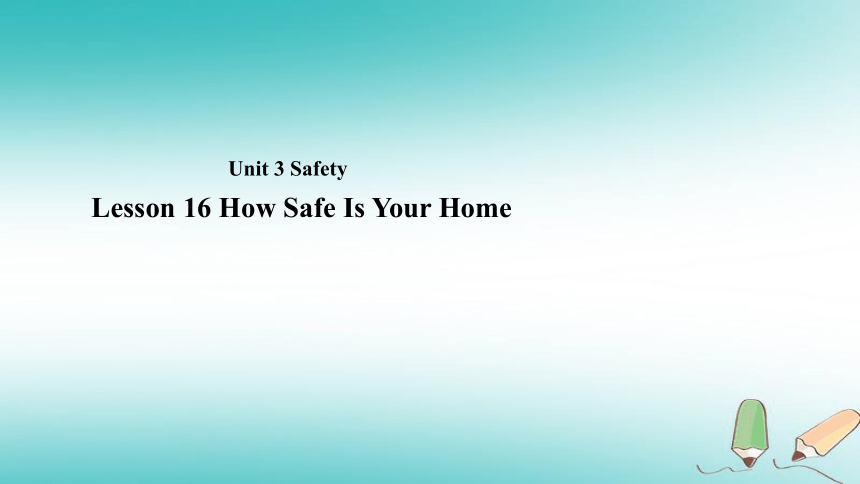
|
|
| 格式 | zip | ||
| 文件大小 | 785.4KB | ||
| 资源类型 | 教案 | ||
| 版本资源 | 冀教版 | ||
| 科目 | 英语 | ||
| 更新时间 | 2018-10-11 16:15:59 | ||
图片预览

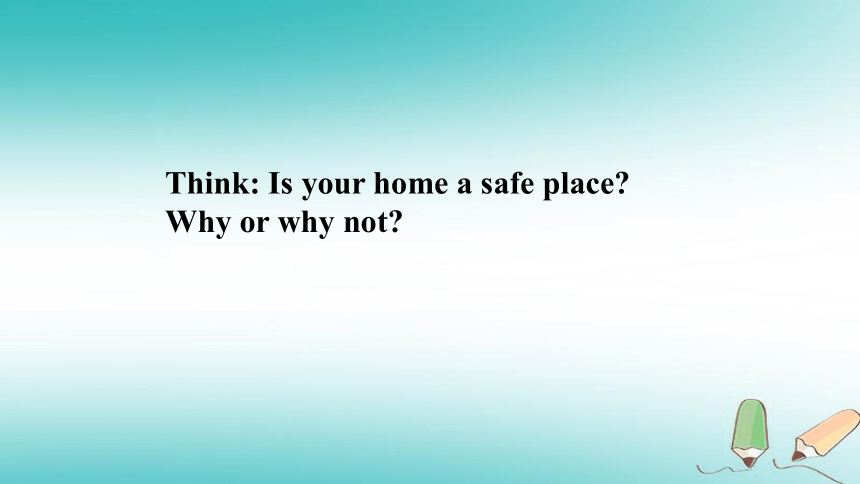
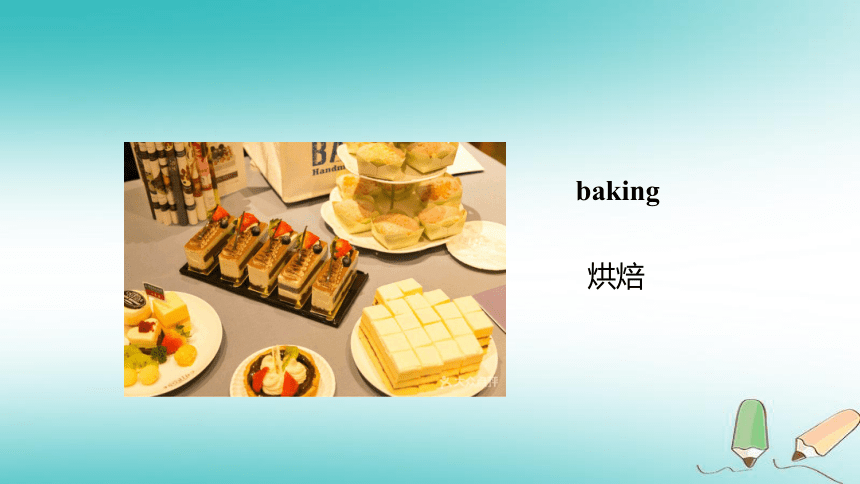
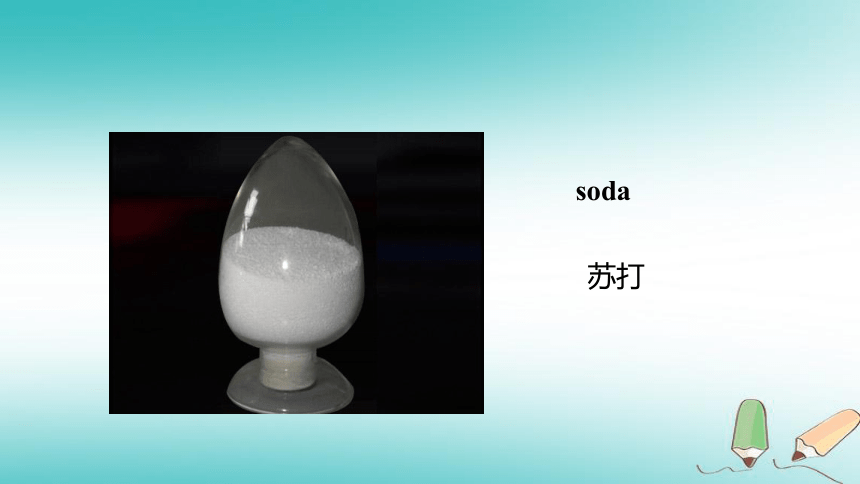
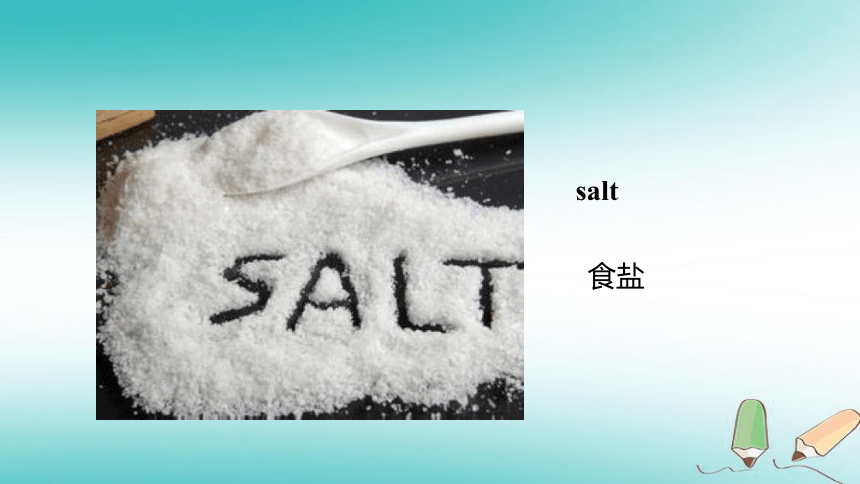
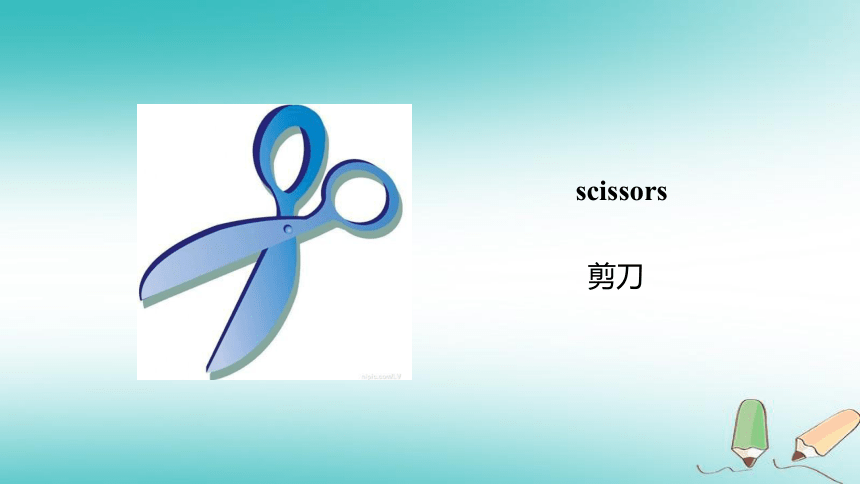
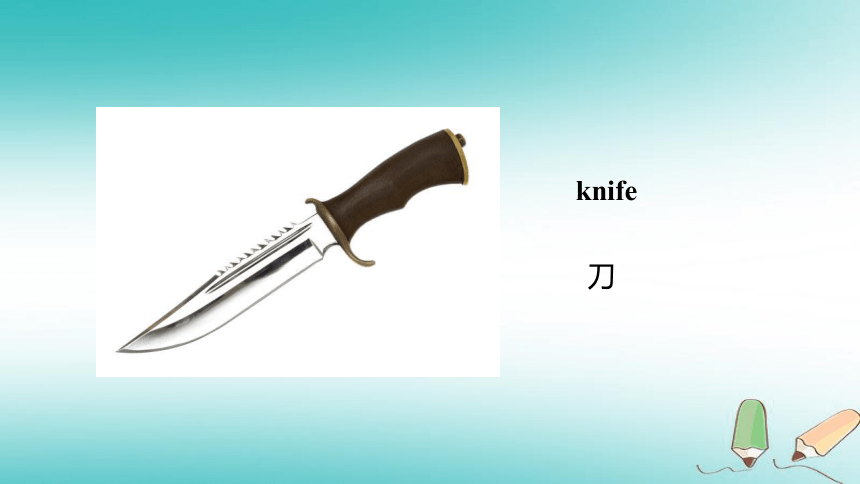
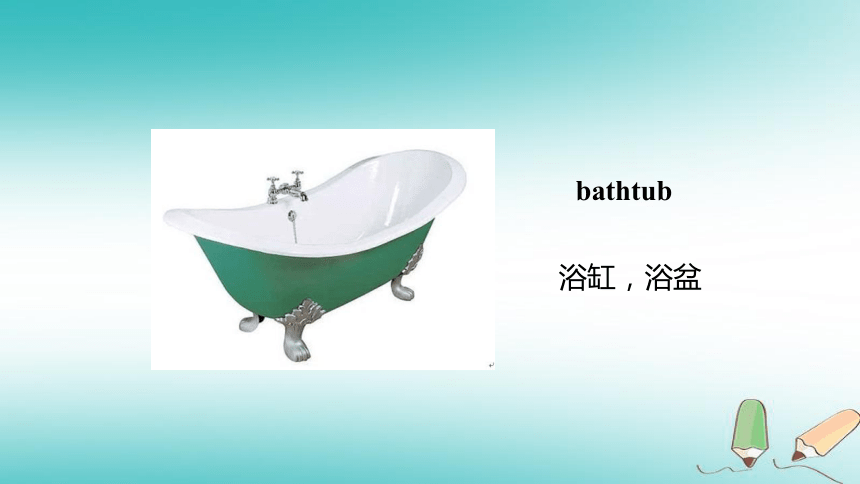
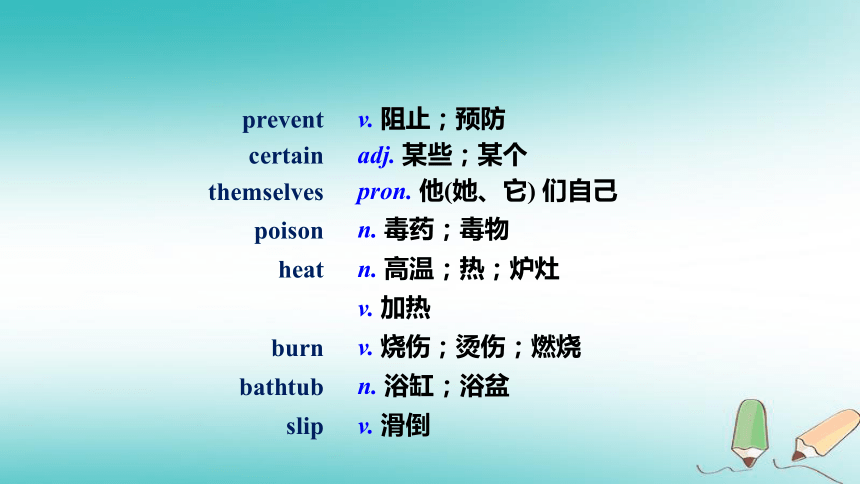
文档简介
课件27张PPT。Unit 3 SafetyLesson 16 How Safe Is Your HomeThink: Is your home a safe place?
Why or why not?
烘焙baking苏打soda食盐salt剪刀scissors刀knife浴缸,浴盆bathtubprevent
certain
themselves
poison
heat
burn
bathtub
slip
v. 阻止;预防
adj. 某些;某个
pron. 他(她、它) 们自己
n. 毒药;毒物
n. 高温;热;炉灶
v. 加热
v. 烧伤;烫伤;燃烧
n. 浴缸;浴盆
v. 滑倒
Listen to Part I and tell true (T) or false (F) Sometimes home is not safe enough. ( )
Kitchen and living room are the two most dangerous rooms in the house. ( )
People can prevent certain accidents. ( ) TFT
(1)Why are the kitchen and the bathroom the two most dangerous rooms in the house?
(2)What are the safety tips to prevent accidents in the kitchen?Read the text and answer the following questions.Because most accidents happen in the kitchen and the bathroom.Don’t stand on chairs.Don’t use water to put out kitchen fires.Be careful with scissors and knives.Don’t keep poisons in the kitchen.(3)What are the safety tips to prevent accidents in the bathroom?
(4)Why shouldn’t parents leave young children alone in the bathtub?
Because children sometimes drown in bathtubs.Never use electricity in the shower or bathtub. Be sure to keep the bathroom floor dry.Can people prevent certain accidents?
prevent为及物动词,意为“阻止,预防”,常用结构prevent sb. from doing sth.意为“阻止某人做某事”,与stop sb. from doing sth.用法相同。
So be careful!
careful为形容词,意为“小心的,仔细的”,其副词形式为carefully,意为“小心地,仔细地”;名词形式为carefulness,意为“小心,仔细,认真”。Many people hurt themselves by falling off chairs.
hurt oneself意为“伤着自己”。hurt themselves表示“伤到他们自己”,其中themselves是反身代词。
fall off意为“掉下来”,强调“从什么地方掉下来”,相当于drop/fall down from,后面接名词作宾语。
put out意为“扑灭,熄灭”,是由“动词+副词”构成的动词短语,后接代词作宾语时,代词要放在put与out中间。
和fire相关的短语:catch fire(着火),make a fire(生火),discover a fire(发现火情),light/start a fire(点火),put out the fire(灭火),set fire to sth.=set sth. on fire(放火烧……),be on fire(失火,在着火)。
Use baking soda or salt instead.
instead为副词,意为“代替,反而,却”,instead of也表示“代替”。
instead,instead of
instead常位于句末,译作“而是”,instead of常位于句中,译作“而不是”。
6.Be careful with scissors and knives!
be careful with意为“小心,谨慎……”。You don’t want to burn yourself.
burn在本句中为动词,意为“燃烧,烧毁,烧坏,烧伤”,其过去式、过去分词有两种形式,即burnt,burnt或burned,burned。
It’s easy to slip and fall on a wet floor.
不定式作主语时,往往用it作形式主语,而将不定式放在后面。这句话中的主语是to slip and fall on a wet floor,It是形式主语,is是系动词,easy是表语。be sure to do sth.意为“务必/切记去做某事”,常用于祈使句中,表示说话人向对方提出要求。
be sure about/of意为“对……有把握,一定会”。
“keep+sth./sb.+形容词”意为“使……处于某种状态”,形容词作宾语补足语。
keep doing sth.一直做某事;keep sb. doing sth.让某人一直做某事。Never leave small children alone in a bathtub.
leave sb./sth. alone.意为“让某人/某物独自留下”。
alone,lonely
(1)alone作副词,用于陈述客观事实,强调独自一人,没有别的同伴;作形容词,在句中作表语或后置定语,强调别无其他,处境安全孤立。
(2)lonely作形容词,意为“孤独的,寂寞的”,具有感彩,在句中作表语或前置定语,修饰某地时,意为“荒凉的,偏僻的”。But before getting on a bicycle, you should double check the following things:
get on意为“上(车、飞机等)”,反义词组为get off。
The tyres are neither too full nor too flat.
neither…nor…意为“既不……也不……”,为并列连词词组,连接两个相同成分。连接两个并列主语时,谓语动词通常与最近的主语在人称和数上保持一致。Read Part II and complete the tableUse baking soda or salt to put out kitchen fires.Be careful with scissors and knives.Be careful with fire and heat when you cook.Don’t stand on chairs.Don’t use water to put out kitchen fires.Don’t keep poisons in the kitchen.Be sure to keep the bathroom floor dry after you have a shower or bath.Never use electricity in the shower or bathtub.Never leave small children alone in a bath tub.Don’t put things which catch fire easily near the stove.1. Tom won’t drive to Beijing. He’ll take a bus i______ .
2. We should eat less s____ to prevent heart disease.
3. Take the k_____ away. The little boy may cut himself.
4. A hot coal fell out the fire and b___________ the shoes.
5. Grandma likes to sit in the sun. She enjoys the h____ of the sun. Fill in the blanks with the correct forms of the words from the lesson. The first letter is given.eatnsteadaltnifeurned/ burntBe Careful!
Here are some of the most common accidents that happen at home:
Scalding — Hot water or drinks can scald you badly. Be careful when you smell your coffee and want to drink it right away!
________ — Every year, quite a lot of children fall and hurt themselves. They fall off furniture or down the stairs. Climbing trees, high walls or fences can be dangerous, too.
________ — Many people are badly burnt or even die in house fires. A cigarette can easily start a fire. People can be burnt by a hot iron or matches.
________ — Glass causes the most serious cuts. So do knives and scissors.
These things should be kept away from children.Read the passage and fill in the blanks with the words in the box.Scalding Cuts Falls BurnsFalls Burns Cuts Find the imperative sentence in this lesson.
Don’t stand on chairs
Keep the floor dry.
Don’t use water to put out kitchen fires.
Be careful with knives.
Don’t keep poisons in the kitchen.
Never leave small children alone in a bathtub.
Three points of the imperative sentences:句首可加do,表示语气强烈,译做“务必”。Do come on time.
否定句加don’t/never但“Let us/me/Let’s+do”多在do前加not. Let’s not talk about it again.
由let’s引出的祈使句反意问句用shall we;由Let us引出的反意问句用will you。Let’s go to the cinema,shall we? Let us do it,will you?
外语教学与研究出版社 九年级 | 全一册 How to keep safe at home. what should we do to stay safe at school or on the way home or to school? Give tips on your posters. Choose one topic to do!Make a poster1. Listen and read.
2. Finish exercises of this lesson.Homework
Why or why not?
烘焙baking苏打soda食盐salt剪刀scissors刀knife浴缸,浴盆bathtubprevent
certain
themselves
poison
heat
burn
bathtub
slip
v. 阻止;预防
adj. 某些;某个
pron. 他(她、它) 们自己
n. 毒药;毒物
n. 高温;热;炉灶
v. 加热
v. 烧伤;烫伤;燃烧
n. 浴缸;浴盆
v. 滑倒
Listen to Part I and tell true (T) or false (F) Sometimes home is not safe enough. ( )
Kitchen and living room are the two most dangerous rooms in the house. ( )
People can prevent certain accidents. ( ) TFT
(1)Why are the kitchen and the bathroom the two most dangerous rooms in the house?
(2)What are the safety tips to prevent accidents in the kitchen?Read the text and answer the following questions.Because most accidents happen in the kitchen and the bathroom.Don’t stand on chairs.Don’t use water to put out kitchen fires.Be careful with scissors and knives.Don’t keep poisons in the kitchen.(3)What are the safety tips to prevent accidents in the bathroom?
(4)Why shouldn’t parents leave young children alone in the bathtub?
Because children sometimes drown in bathtubs.Never use electricity in the shower or bathtub. Be sure to keep the bathroom floor dry.Can people prevent certain accidents?
prevent为及物动词,意为“阻止,预防”,常用结构prevent sb. from doing sth.意为“阻止某人做某事”,与stop sb. from doing sth.用法相同。
So be careful!
careful为形容词,意为“小心的,仔细的”,其副词形式为carefully,意为“小心地,仔细地”;名词形式为carefulness,意为“小心,仔细,认真”。Many people hurt themselves by falling off chairs.
hurt oneself意为“伤着自己”。hurt themselves表示“伤到他们自己”,其中themselves是反身代词。
fall off意为“掉下来”,强调“从什么地方掉下来”,相当于drop/fall down from,后面接名词作宾语。
put out意为“扑灭,熄灭”,是由“动词+副词”构成的动词短语,后接代词作宾语时,代词要放在put与out中间。
和fire相关的短语:catch fire(着火),make a fire(生火),discover a fire(发现火情),light/start a fire(点火),put out the fire(灭火),set fire to sth.=set sth. on fire(放火烧……),be on fire(失火,在着火)。
Use baking soda or salt instead.
instead为副词,意为“代替,反而,却”,instead of也表示“代替”。
instead,instead of
instead常位于句末,译作“而是”,instead of常位于句中,译作“而不是”。
6.Be careful with scissors and knives!
be careful with意为“小心,谨慎……”。You don’t want to burn yourself.
burn在本句中为动词,意为“燃烧,烧毁,烧坏,烧伤”,其过去式、过去分词有两种形式,即burnt,burnt或burned,burned。
It’s easy to slip and fall on a wet floor.
不定式作主语时,往往用it作形式主语,而将不定式放在后面。这句话中的主语是to slip and fall on a wet floor,It是形式主语,is是系动词,easy是表语。be sure to do sth.意为“务必/切记去做某事”,常用于祈使句中,表示说话人向对方提出要求。
be sure about/of意为“对……有把握,一定会”。
“keep+sth./sb.+形容词”意为“使……处于某种状态”,形容词作宾语补足语。
keep doing sth.一直做某事;keep sb. doing sth.让某人一直做某事。Never leave small children alone in a bathtub.
leave sb./sth. alone.意为“让某人/某物独自留下”。
alone,lonely
(1)alone作副词,用于陈述客观事实,强调独自一人,没有别的同伴;作形容词,在句中作表语或后置定语,强调别无其他,处境安全孤立。
(2)lonely作形容词,意为“孤独的,寂寞的”,具有感彩,在句中作表语或前置定语,修饰某地时,意为“荒凉的,偏僻的”。But before getting on a bicycle, you should double check the following things:
get on意为“上(车、飞机等)”,反义词组为get off。
The tyres are neither too full nor too flat.
neither…nor…意为“既不……也不……”,为并列连词词组,连接两个相同成分。连接两个并列主语时,谓语动词通常与最近的主语在人称和数上保持一致。Read Part II and complete the tableUse baking soda or salt to put out kitchen fires.Be careful with scissors and knives.Be careful with fire and heat when you cook.Don’t stand on chairs.Don’t use water to put out kitchen fires.Don’t keep poisons in the kitchen.Be sure to keep the bathroom floor dry after you have a shower or bath.Never use electricity in the shower or bathtub.Never leave small children alone in a bath tub.Don’t put things which catch fire easily near the stove.1. Tom won’t drive to Beijing. He’ll take a bus i______ .
2. We should eat less s____ to prevent heart disease.
3. Take the k_____ away. The little boy may cut himself.
4. A hot coal fell out the fire and b___________ the shoes.
5. Grandma likes to sit in the sun. She enjoys the h____ of the sun. Fill in the blanks with the correct forms of the words from the lesson. The first letter is given.eatnsteadaltnifeurned/ burntBe Careful!
Here are some of the most common accidents that happen at home:
Scalding — Hot water or drinks can scald you badly. Be careful when you smell your coffee and want to drink it right away!
________ — Every year, quite a lot of children fall and hurt themselves. They fall off furniture or down the stairs. Climbing trees, high walls or fences can be dangerous, too.
________ — Many people are badly burnt or even die in house fires. A cigarette can easily start a fire. People can be burnt by a hot iron or matches.
________ — Glass causes the most serious cuts. So do knives and scissors.
These things should be kept away from children.Read the passage and fill in the blanks with the words in the box.Scalding Cuts Falls BurnsFalls Burns Cuts Find the imperative sentence in this lesson.
Don’t stand on chairs
Keep the floor dry.
Don’t use water to put out kitchen fires.
Be careful with knives.
Don’t keep poisons in the kitchen.
Never leave small children alone in a bathtub.
Three points of the imperative sentences:句首可加do,表示语气强烈,译做“务必”。Do come on time.
否定句加don’t/never但“Let us/me/Let’s+do”多在do前加not. Let’s not talk about it again.
由let’s引出的祈使句反意问句用shall we;由Let us引出的反意问句用will you。Let’s go to the cinema,shall we? Let us do it,will you?
外语教学与研究出版社 九年级 | 全一册 How to keep safe at home. what should we do to stay safe at school or on the way home or to school? Give tips on your posters. Choose one topic to do!Make a poster1. Listen and read.
2. Finish exercises of this lesson.Homework
同课章节目录
- Unit 1 Stay Healthy
- Lesson 1 What's Wrong,Danny?
- Lesson 2 A Visit to the Dentist
- Lesson 3 Good Food, Good Health
- Lesson 4 Don't Smoke, Please!
- Lesson 5 Jane's Lucky Life
- Lesson 6 Stay Away from the Hospital
- Unit Review
- Unit 2 Great People
- Lesson 7 What Is the Meaning of Lift?
- Lesson 8 A Universe of Thought
- Lesson 9 China's Most Famous "Farmer"
- Lesson 10 Touch the World
- Lesson 11 To China, with Love
- Lesson 12 Guess My Hero!
- Unit Review
- Unit 3 Safety
- Lesson 13 Be Careful,Danny!
- Lesson 14 Accidents Happen
- Lesson 15 My Helmet Saved My Life!
- Lesson 16 How Safe Is Your Home?
- Lesson 17 Staying Safe in an Earthquake
- Lesson 18 Never Catch a Dinosaur
- Unit Review
- Unit 4 Stories and poems
- Lesson 19 A Story or a Poem?
- Lesson 20 Say It in Five
- Lesson 21 The Fable of the Woodcutte
- Lesson 22 The Giant(Ⅰ)
- Lesson 23 The Giant(Ⅱ)
- Lesson 24 Writing a Poem
- Unit Review
- Unit 5 Look into Science
- Lesson 25 Let's Do an Experiment!
- Lesson 26 Keep the Candle Burning
- Lesson 27 Planet Danny
- Lesson 28 The Study of Living Things
- Lesson 29 DNA—The Story of You
- Lesson 30 Science Affects Us
- Unit Review
- Unit 6 Movies and Theate
- Lesson 31 A movie or a Play
- Lesson 32 Moving Pictures
- Lesson 33 The Fisherman and the Goldfish(Ⅰ)
- Lesson 34 The Fisherman and the Goldfish(Ⅱ)
- Lesson 35 Theatres Are Fun!
- Lesson 36 Making Plays Is Fun
- Unit Review
